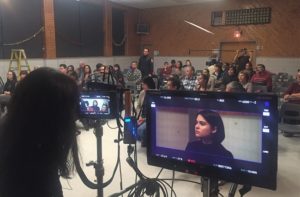Indigenous filmmaker shoots first feature-length film in Anishinaabemowin

By Rick Garrick
KITIGAN ZIBI ANISHINABEG — Indigenous filmmaker and artist Caroline Monnet recently returned to her mother’s community of Kitigan Zibi Anishinabeg in Quebec to shoot her first feature-length film Bootlegger.
“I grew up not in Kitigan Zibi but closer to Gatineau, and it is a region we hardly ever see on screen so it was important for me to get the people involved from Kitigan Zibi into the film,” Monnet says. “It was quite the experience — it’s my first feature film so I’ve been learning a lot. There was a great response and generosity from the community.”
Monnet began shooting the film in mid-November in Kitigan Zibi, with plans to wrap up filming in Montreal on Dec. 21. The film was shot in French and Anishinaabemowin and included local residents as actors, extras and technical staff. Monnet’s previous work includes about a dozen short films, including documentary, experimental and fiction films. Her work has been featured at numerous venues, including Palais de Tokyo in Paris, Haus der Kulturen der Welt in Berlin, Sundance Film Festival, Cannes Film Festival and Toronto Biennale of Art 2019.
“The three teenagers in the story are all coming from there, the grandfather as well,” Monnet says. “It’s been really tremendous for me to meet all my cousins and just learn more about my family. I also brought my grandfather back to the community and put him into one of the scenes as well. It was like a really special moment for me.”
Monnet’s film is about an ambitious young lawyer who rushes back to her remote Indigenous community after her grandmother is injured. She soon proposes a referendum to end the prohibition of alcohol on reserve, but is opposed by a 45-year-old bootlegger.
“She kind of struggles to find her place within the community — the only way she knows how is to get involved politically and she calls for a referendum to end the prohibition law,” Monnet says. “For me, it was mostly to talk about the aggressive politics from the Canadian government, to see how the Indian Act impacted many First Nations and how it is still kind of in place right now. The movie is really about taking its own destiny in hand and having the right to vote and make your own decisions, and also the emancipation of the main character but also the community itself.”
Sheldon McGregor, associate producer of the film and a Kitigan Zibi Anishinabeg citizen, says the film focuses on the young lawyer’s journey to become a catalyst for change.
“She represents education,” McGregor says. “She is getting a lot more power in the community. For example, as a young professional woman, [it’s] her taking her place back in her community.”
McGregor says it was important to get community members involved in the film, noting that about 30 of the 70 people who worked on the film were from the community.
“We have to hire and bring jobs to the community and give people the chance to explore the film, invite young people on set [and] give young actors from the community a chance,” McGregor says. “It’s really hard for people in the region to find work so we brought a lot of money to the region and a lot of opportunity to the region for people to get introduced into film and into the arts as well.”
The film was produced by Catherine Chagnon for Microclimat Films with the financial support of Société de développement des entreprises culturelles (SODEC), Telefilm Canada and the Harold Greenberg Fund.


